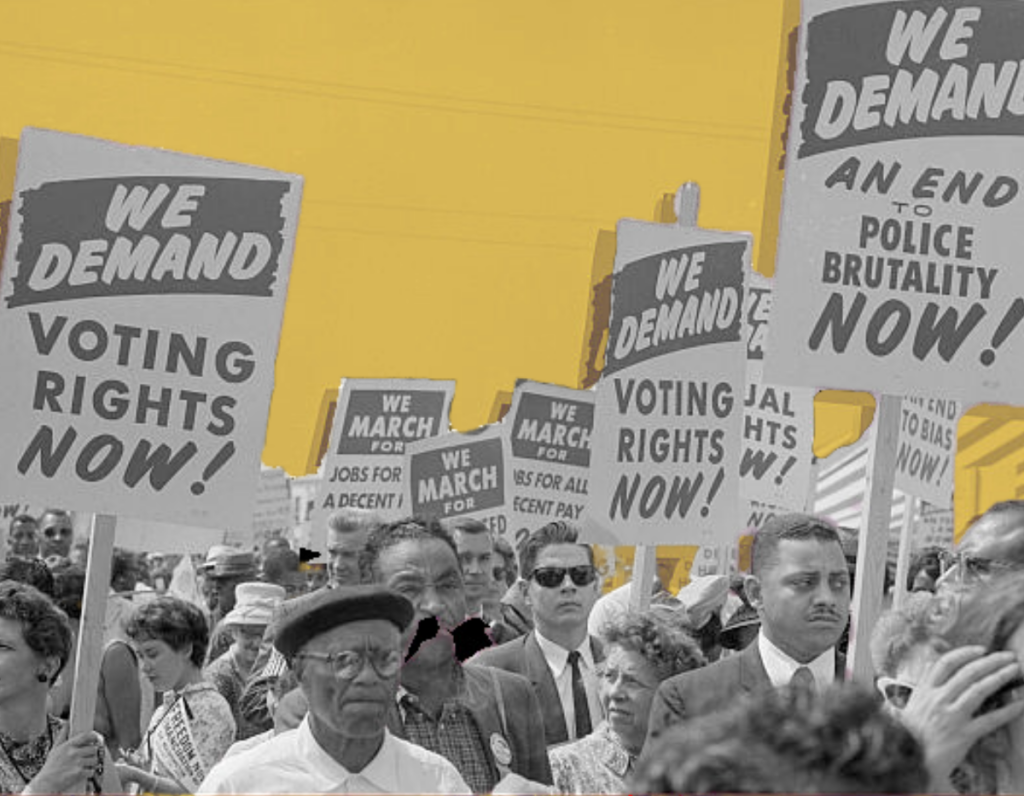Readings
- Erica Chenoweth, Marcy Rein and Zoe Marks, “Organizing Against Autocracy in the US,” Convergence, November 11, 2022. And if you have time, see the Organizing Against Autocracy Series featuring responses and follow-ups to the Chenoweth/Marks interview by Bob Master, Desmond Serrette, James Mumm & Scott Nakagawa, Molly Shack & Stephanie Luce, Lauren Jacobs & Stephanie Mitchell, Mariana Ruiz Firmat, Erin Heaney, and Sulma Arias.
- Richard Healey, “Organizing for Governing Power,” Grassroots Policy Project, December 2015.
- Peter Olney and Rand Wilson, “On the Sidelines: DSA’s Abstentionism on Biden vs. Trump,” Convergence, December 16, 2020.
- Anthony Thigpenn and Jon Liss, “The Left Needs a United Front in Every State,” Convergence, October 17, 2019.
Key Points
- The fight for political democracy is integrally connected to—and an indispensable component of—fighting for a better life for all those who are exploited, oppressed, marginalized, and discriminated against. Because of the close interconnection between white Christian Nationalism and capitalism, democratic struggles are essential to opening up progressive resolutions to the crisis of neoliberal capitalism.
- The electoral system in the US is structurally biased in racist and anti-democratic ways (Electoral College, Senate, winner-take-all system instead of proportional representation, the role of money in politics, gerrymandering, etc.). Still, it is elected bodies that make crucial policy choices, and the vast majority of the population engages politics through the electoral system. So, the struggle for social justice and radical change cannot bypass the existing electoral system even as we fight to transform its character. The right to vote, the right for everyone’s vote to be counted fairly and have equal weight, the checks on racist voter suppression contained in 1965 Voting Rights Act—gains in all these areas were won via blood, sweat and tears. They are under severe attack and must be defended. Indeed, they must be expanded in numerous ways: re-enfranchising formerly incarcerated people, allowing immigrants to vote in local elections, making voting easier especially for working-class and poor people via vote-by-mail and early voting, and looking toward passage of legislation such as the John Lewis Voting Rights Act.
- Beyond advancing toward full voting rights and political rights generally (free speech, assembly, press, etc.), the emerging progressive current must fight to be represented in government at all levels. We aim to elect candidates that are committed to a social justice agenda, to grow strong enough for blocs of progressive candidates to be a recognized force in governing coalitions at the local, state, and federal level, and eventually to be the dominant partner in such governing coalitions. This fight for representation and governing power cannot be won via electoral efforts alone; it requires electoral work to be conducted in tandem with other forms of political, economic, and cultural struggle, including: labor strikes, mass protest actions, base-building, mutual aid, contention in the spheres of art and culture, etc.
- The US has a unique federal system in which extensive powers are granted to state governments, so contention for governing power at the state level must be a crucial component of the Block and Build project. The Far Right is already implementing its agenda and building “authoritarian enclaves” in states where the Republican Party controls both the governorship and state legislature. Progressives must be in the forefront of efforts to break their grip on power in these “Red States” and gain enough clout in some “Blue States” to show what progressives can deliver when they have a major share of governing power.
Competing View
The main alternative left view on this point disagrees with seeing electoral engagement as a part of a strategy aimed at gaining a measure of governing power. In its most extreme version, electoral work is seen as distracting from or even undermining the “real work” of building power through non-electoral mass movements. A more common version is not opposed to all electoral efforts but sees them strictly as an educational or agitational tactic, that might in some situations be useful for building non-electoral mass movements. For an example of the latter, see “Building Class Power, Not Electoralism, Is the Future of the Left,” by Natalia Tylim in New Politics.
This difference is a current manifestation of debates in the Left on the nature of the state, and whether the road to working-class rule in advanced democracies runs through the electoral systems that the majority of that country's residents engage in, or through the creation of alternative structures and/or revolutionary ruptures with existing structures.
Questions for Discussion
- Not only are voting rights under attack, but there are numerous anti-democratic features built into the US electoral system. What do you see as current priorities for the Left in terms of defending the right to vote and making changes toward a more democratic arrangement? What do you see as possible to achieve between now and the 2024 election and in the immediate aftermath of that contest?
- What prospects do you see for progressives to be an influential part of a governing coalition in the state you live in? How do you compare your state to others on the spectrum of Republican-controlled state governments through state governments where neither party is in total control to states where Democrats hold trifectas?
- What’s your assessment of the level of influence of progressives in the current national governing coalition, and what gains do you think can be made in 2024?
- What do you see as the potential and the limitations of attaining governing power for the structural changes needed to bring about a truly democratic and just society?
